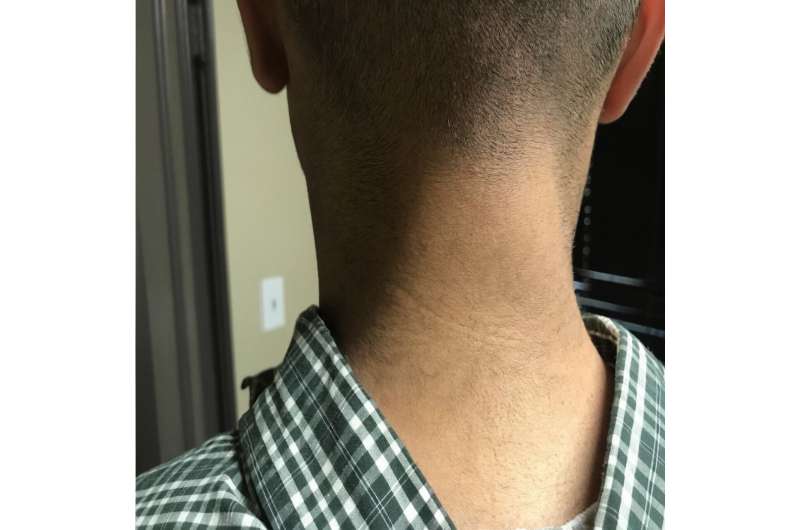This article has been reviewed according to Science X's editorial process and policies. Editors have highlighted the following attributes while ensuring the content's credibility:
fact-checked
trusted source
proofread
East Los Angeles program to remove tattoos may help reduce traumatic injuries

Tattoo removal may help to reduce violence and trauma in East Los Angeles, according to study results being presented at the American College of Surgeons (ACS) Clinical Congress 2023.
Interpersonal violence is a leading cause of traumatic injury in the United States. Tattoos identified with gangs or sex work can make individuals a target for violence, according to a study led by Damon H. Clark, MD, FACS, a general surgeon and assistant professor of clinical surgery at Keck School of Medicine of USC in Los Angeles. In addition, disparities in substance abuse, poverty, education, community safety, and employment opportunity underlie individual risk for exposure to violence, the authors note.
The study showed that removing those tattoos, in exchange for community service and science education, may help these individuals reduce their exposure to violence, build a new identity, and gain employment. Individuals with gang-related tattoos often have a harder time getting jobs or joining the military, which does not allow recruits to have tattoos on certain exposed areas of their bodies, such as face, neck, or hands, Dr. Clark said. Even compared with other American cities, tattoos are a particularly significant part of the Los Angeles culture, he said.
"Violence can come from rival gang members or even from police, who may act in a more heightened, urgent, and aggressive way when they see someone with a gang tattoo," Dr. Clark said. "Tattoo removal helps protect individuals and is part of the healing process, helping them get a new identity and job opportunities."
Removing the tattoos can help individuals break away from a former life and establish a new identity, helping to prevent relapse, and also may prevent suicide, which is part of the trauma that the program is trying to prevent, Dr. Clark said.
"A lot of clients who come to get tattoos removed were sex workers," Dr. Clark said. "They get the tattoo removed to move on with their life emotionally and physically."
Removing a tattoo typically costs between $200 and $500 per session. Removing a tattoo done by a professional can require six to eight sessions. However, more than half of the clients get their tattoos from amateurs, often while incarcerated. In prison, for example, tattoo artists use improvised ink, such as paint scrapes, pen ink or pencil lead, and improvised tattoo machines. These tattoos are often more difficult to remove, and may require 15 to 20 sessions, he said.
The program's "fee" is for clients to do five hours of community service for each session, which could consist of school attendance, volunteering at a church or non-profit, or attending an Alcoholics Anonymous or Narcotics Anonymous meeting. In addition to Dr. Clark, general surgery residents, emergency department residents, and medical students do the removal procedures. The program, which has just one room and one laser, now has about 300 clients undergoing tattoo removal.
Besides tattoo removal and community service, the program exposes the clients to education, particularly in science, such as biology and health care-related subjects. Sometimes, mentorship and substance use disorder counseling are also provided when appropriate.
One of the earliest clients of the program, which started in 2016, was a high school dropout when he began getting his gang-related tattoos removed, Dr. Clark said. After going through the program, the client finished high school, attended a four-year college, and is now a Secret Service agent in Washington, D.C.
"Violence is a medical problem and is a big cost on our country, our hospitals, and our productivity," Dr. Clark said. "If we treat it as a disease instead of a social problem, we'd be better off."
Study details
Surgeons and doctoral students from Keck School of Medicine partnered with Soledad Enrichment Action (SEA) to perform laser tattoo removal in exchange for community service. Clients completed a voluntary, anonymous survey regarding tattoo acquisition and motivation for removal. Medical students and faculty also taught life skills, violence intervention, science, and mindfulness enrichment courses.
Key findings
As part of the study, 26 individuals (46% female, 54% male) reported full removal of 35 tattoos after 208 total sessions. Clients performed more than 17,265 hours of community service.
The researchers found:
- 88% of the clients desired tattoo removal to transition to a healthier life.
- 81% of the clients reported success in achieving their goals with tattoo removal, including escaping gang affiliation and improving job prospects.
- Students of enrichment courses ranked interest in biology 4.5 out of 10 prior to enrichment and 8.6 after.
Other study authors include Helena Bugacov, Ph.D., and Anaar E. Siletz, MD, Ph.D., Keck School of Medicine, and Michael Massa, EdD, Central Juvenile Hall High School.
More information: Clark DH, et al. A Multipronged Approach to Primary Prevention of Trauma in East Los Angeles, Scientific Forum, American College of Surgeons (ACS) Clinical Congress 2023.



















